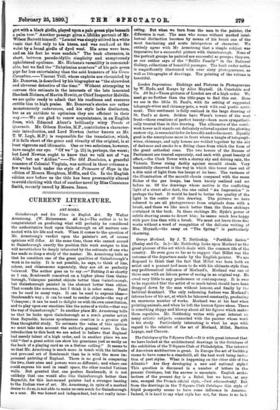London Impressions. Etchings and Pictures in Photogravure by W. Hyde,
and Essays by Alice Meynell. (A. Constable and Co. .23 884—These pictures of London are of a high order. We need go no further than the title-page to find this out. Here we see in the little St. Paul's, with its setting of suggested telegraph-wires and chimney-pots, a work with real poetic senti- ment. This sentiment is fully realised in the large drawing of St. Paul's at dawn. Seldom have Wren's towers of the west • front—those creations of perfect beauty—been more sympatheti- cally treated than in this drawing. The silhouette of the south- west tower as it stands out delicately relieved against the glowing eastern sky, is remarkable for its breadth and refinement. Equally good is the amorphous mass in front where a tangle of telegraph. wires, chimneys, and ugly houses are welded together by the aid of darkness and smoke to a fitting chaos from which the form of the great cathedral rises. The two towers of the Houses of Parliament are treated separately, and each with great beauty of effect,—the Clock Tower with a stormy sky and driving rain, the Victoria Tower rising darkly against moonlit clouds. Very beautifully observed is the way in which this tower rises out of a dim mist of light from the lamps at its base. The vastness of the illumination of the moonlit clouds compared with the mean flicker of the gas lamps, has been keenly realised and set before us. Of the drawings whose motive is the conflicting light of a street after dark, the one called " An Impression " is perhaps the best. It would be hard to better the quality of the light in the centre of this drawing. The pictures we have referred to are all photogravures from originals done with a brush, and these we like much better than the three etchings contained in the book. In these etchings Mr. Hyde's power of subtle drawing seems to desert him; he seems much less happy with pure line than with a brush. We must not leave these tine works without a word of recognition of the delicate writing of Mrs. Meynell,—the essay on "The Spring" is particularly charming.






































 Previous page
Previous page